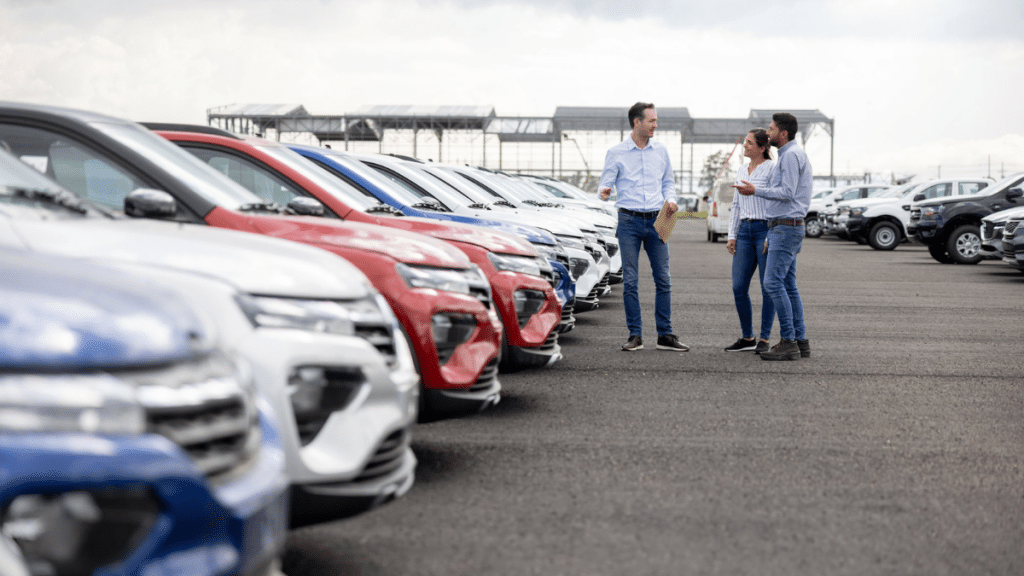The used car world is buzzing! It’s a huge industry that lets you get started more easily than opening a new car dealership. But don’t be fooled, becoming successful doesn’t happen overnight. From knowing what cars people want to using key tools like a special professional diagnostic scanner to check car health, there’s a lot to learn. This guide will walk you through the important steps to help you start your used car business with skill and confidence.
Did you know the used car market is growing steadily? The global used car market was valued at around $1.75 trillion in 2024 and is expected to grow from $1.93 trillion in 2025 to reach over $4.3 trillion by 2033, growing at a strong rate of about 10.63% each year during that time. (Source: Straits Research Report, 2025). This shows there’s a big opportunity for those who do it right.
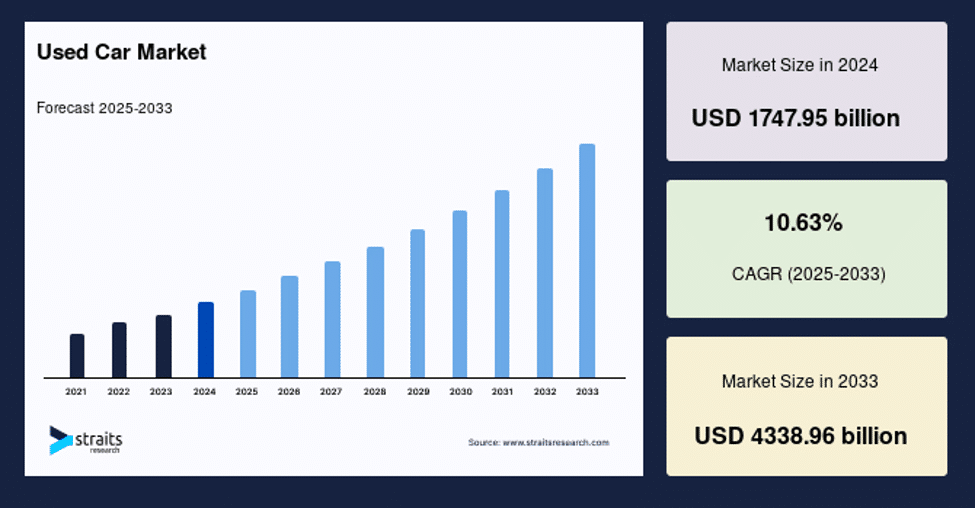
- The market size is trillions of dollars for 2024, 2025, and 2033 based on the Straits Research data.
Research, Research, Research: Understand Your Market
Before you spend a single dollar, you need to deeply understand the used car market right where you are. This isn’t just about what types of cars are popular; it’s about digging deeper.
- What cars do people need? Are little, fuel-efficient cars popular in your city, or do family in the environs want SUVs and trucks? Look at things like local gas prices – if gas is luxurious, people might prefer cars that save fuel. For example, in 2024, SUVs were anticipated to have the biggest share of the second-hand car market. (Source: Straits Research Report).
- Who lives nearby? Think about the average profits of the public in your area. Are they looking for budget-friendly cars, or can they afford something more upscale?
- What are your rivals doing? Check out other used car dealers just about you. How do they price their cars? What kind of warranties or reimbursement plans do they suggest? How do they get clients during the door? Knowledge from them helps you find your own way to position out.
Expressing your marketplace inside and out helps you select the right cars to sell and propose services that in fact meet what buyers are looking for. This very much increases your probability of making money and staying in business for a long time.
Create a Business Plan
Your business plan is like a detailed map for your business. It helps you set clear goals and give you a stable path to follow. A physically powerful used car business plan should cover:
- Startup Costs and Budget: How much money do you need to start? Imagine about all: buying cars, rent for your set, tools, marketing, and even money for unexpected repairs.
- Target Customers: Who are you selling to? Are you focused on reasonable cars, luxury vehicles, or maybe work trucks? Organisms understandable about your goal customer helps you make smart choices.
- How You’ll Sell and Advertise: What’s your arrangement to get public to your lot or website?
- Money Goals: How many cars do you imagine to sell? How much money do you hope to make?
- How you’ll operate: Who will do what? Do you need to hire staff right away?
These plans are super significant, particularly if you want a loan from a bank or want to bring in business partners.
Get Licensed and Registered
To play by the rules, you must verify your business and get all the indispensable licenses. This varies from position to position, so for all time check your local rules.
- Select and Enroll Your Business Name: make a decision if you’ll be a one-an important person business (sole proprietorship) or a business (like an LLC). These influence how you pay taxes and your secret risk.
- Get a Used Car Dealer’s License: This is a large one. Rules are special everywhere, but you might need to pass backdrop checks, show you have adequate money, or even take some training courses.
- Get a Sales Tax ID Number: You’ll need this to gather sales tax on the cars you sell.
- Insurance and a Surety Bond: You’ll need insurance to protect your business from accident or injury. A warranty bond is like a swear to your customers that you’ll follow the rules.
- Local Laws: Make sure your selected location follows local rules for business, especially about where you can sell cars.
Reach out to your local branch of Motor Vehicles (DMV) or the organization that handles business licenses. They will give you the exact necessities for your area. Don’t skip this step!
Pick Your Location
Where you set up shop very much affects how many consumers you magnetize. Select a spot that’s simple to see and obtain, with adequate space to show off at least 10 to 20 cars. It should be in a busy area, have plenty of parking, a good office space, and reliable security.
If a large lot is too expensive at first, don’t worry! Many dealers start minor or even sell cars online only. Some begin by selling cars from home or through engagements. The main thing is to start smart and develop when you’re ready.
Price Your Cars Right
Setting the correct price is key to magnetize clients and stay ahead of rivals. Use trust guides and be fond of Kelley Blue Book (KBB) or Edmunds to find the fair marketplace value of each car.
- Know Your Costs: Make sure you include all your expenses when setting a charge: what you paid for the car, any money you spent on maintenance, cleaning, advertising, and your visual projection (like rent and salaries). You wish to build sure you include strong benefits.
- Average Profit: Did you know that the typical “front-end” earnings (what you make from the sale price of the car itself, before other prices) for a used car can be about $1,000 to $3,000 per vehicle? (Source: ACV Auctions Blog, 2025). This shows you necessitate being neat about prices and managing your costs.
- Extra Services: You might also offer payment strategy, warranties, or certified car programs. These can help justify a little higher price and build trust with buyers.
- The average gross profit per used car.
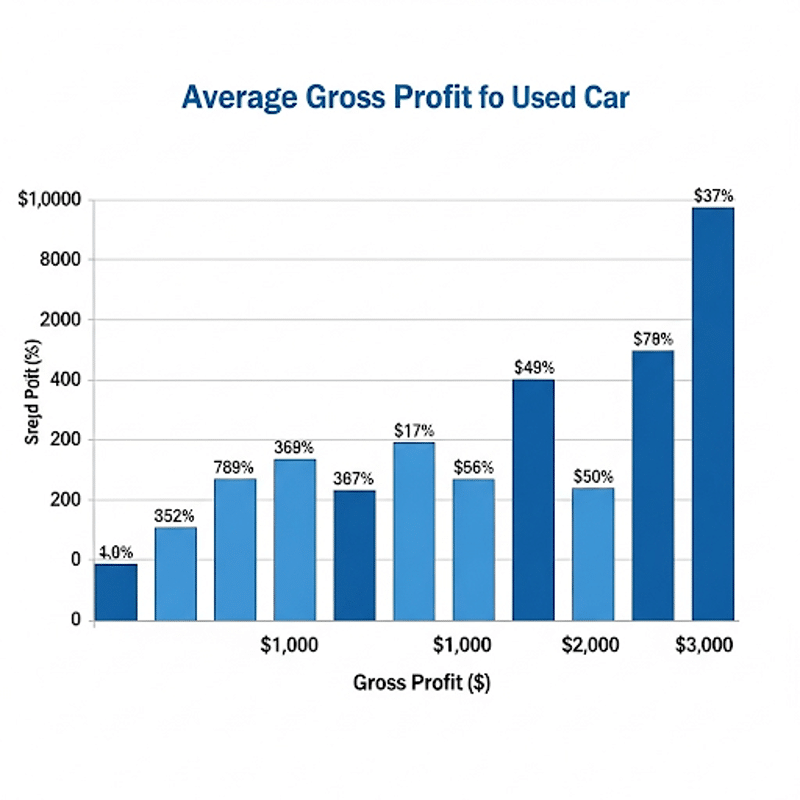
Build Your Online and Offline Presence
In today’s world, being visible online is just as important as having a physical car lot.
Online:
- Create a Professional Website: This is your online showroom. It requires good photos, clear prices, and all the facts about each car.
- Use Online Ads: Run ads on Google and Facebook that target people in your area who are looking for cars.
- Use SEO (Search Engine Optimization): This helps your dealership’s website embarrass top when citizens search for cars on Google. For example, if an important person searches “used cars near me,” you want your site to be one of the first they see.
- List on Car Sites: Put your cars on popular websites like Auto trader and Cars.com. Online sales channels are expected to expand at a quick growth rate of 5.31% each year through 2030 in the US second-hand car market. (Source: Mordor Intelligence Report on US Used Car Market, 2025).
- Be on Social Media: Share photos of new cars, tips, and high-quality reviews on social media sites.
- Growth of online sales channels in the used car market (from 2024 to 2030, showing the 5.31% CAGR).
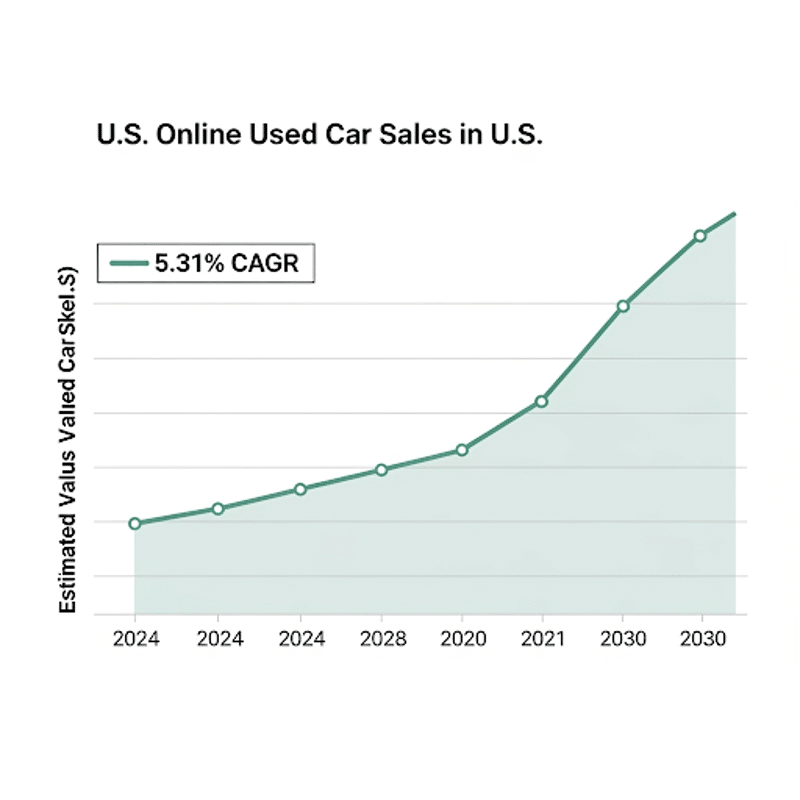
Offline:
- Signs and Banners: Use clear signs at your lot.
- Local Ads: judge ads in local newspapers or on the radio.
- Referral Discounts: suggest a discount to clients who send new buyers your way.
- Clean and Tidy Lot: Make sure your material lot looks clean and professional.
Provide Excellent Customer Service
A used car business in fact grows on trust. Buyers want to feel sure they are making a secure and smart acquisition. Build that trust by contribution:
- Honest Car Descriptions: Be totally upfront about the car’s condition. If there are any known issues, tell the customer. Provide vehicle record reports (like Car Fax or Auto Check) so they can observe the car’s past.
- Flexible Payment Choices: Work with unusual lenders to give clients various ways to pay, even if their credit isn’t great.
- Warranties or Guarantees: submission of a warranty, even a vital one, gives customers peace of mind.
- Help after the Sale: Your connection doesn’t end when the car is sold. Follow up, offer help with verifying, and propose good local mechanics.
- Friendly Staff: Train your team to be helpful, informed, and truthful. Encourage happy clients to leave reviews online – these reviews are like gold to attract new buyers!
Use Diagnostic Tools and Quality Checks
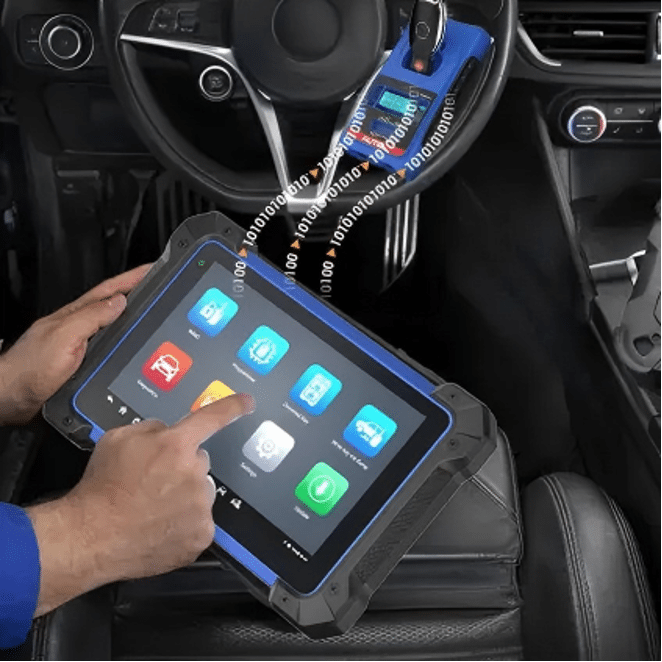
Now, let’s talk about something truly important, amazing that, after 10 years in this commerce I can tell you is completely important: the vital role of diagnostic tools and a thorough superiority check process.
You can have the best marketing, the best location, and the friendliest sales group, but if the cars you sell break down speedily, your business won’t last. This is where important diagnostic tools come in. They are your first line of argument against expensive issues and a broken reputation.
1. Finding Hidden Problems: Your Car’s Health Report
o An OBD2 scanner (On-Board Diagnostics II) is much more than immediately a tool to understand a “Check Engine” light. Modern cars are like complex computers on wheels. A simple advice light often only tells you a small part of a larger problem.
o Beyond the Dashboard: A good OBD2 scanner, or even better, a more superior diagnostic tool, can look at information from various parts of the car: the engine, communication, brakes (ABS), airbags, and more. This helps you find harms that might not show a warning light but could lead to huge repair bills later. For example, it can spot tiny problems with sensors or problems that are just starting to happen.
o Buying Smart: Before you even think about exporting a car for your dealership, a full diagnostic scan is a must. This common step can save you thousands of dollars in unexpected repair prices. I’ve seen many “best deals” turn into financial headaches because the dealer didn’t take little minutes to do a proper scan.
o Controlling Costs: By judgment issues early, you can accurately guess how much money you’ll need to spend on repairs. This helps you choose how much to pay for a car in the first place, making sure you still make the best benefit. It takes away the “guess match” of repair costs.
o Building Trust with Customers: When a customer asks about a car’s condition, being able to show them a clean diagnostic report – or truthfully talk about any small issues that have been fixed – builds huge trust. It shows you’ve done your homework. A printed report from your pre-sale check can be a very strong selling point.
o The market for these diagnostic tools is growing fast! The global Automotive Diagnostic Scan Tools Market is expected to grow from $5.0 billion in 2024 to $12.0 billion by 2034, with a tough growth velocity of 9.10% each year. This growth is driven by cars that are more multifaceted, stricter rules for emission, and more electric vehicles on the road. Also, there’s a 25% increase in demand for cloud-based diagnostic solutions as dealers shift towards wireless and remote ways to check cars. (Source: Market Summary Data, 2025). This shows how vital these tools are becoming in the car world.
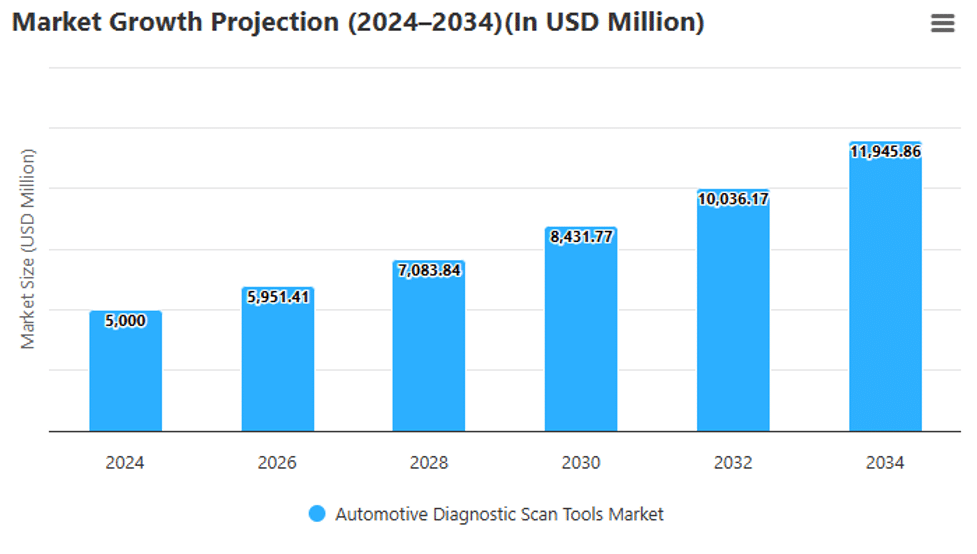
- The market range in billions of dollars for 2024 and 2034, based on the provided information ($5.0 billion in 2024 to $12.0 billion by 2034)
2. More Tools for Your Kit
o Battery Testers: A weak battery can cause many electrical issues and leave a customer stranded. A good battery tester quickly tells you if the battery is healthy.
o Tire Tread Depth Gauges: Crucial for safety and reconditioning costs. Worn tires are a safety hazard and a significant reconditioning expense.
o Brake Pad Gauges: Similar to tires, brakes wear straight impacts safety and cost.
o Paint Thickness Gauges: An invaluable tool for identifying previous bodywork, undisclosed accidents, or extensive repaints. Contradictory paint width can be a red flag.
o Inspection Cameras (Borescopes): For peering into hard-to-reach areas like engine cylinders or last dashboards to check for leaks, injure, or unseen issues.
o MultiMate’s: For essential electrical system testing, diagnosing wiring issues, and checking component integrity.
o Fluid Testers (Coolant, Brake Fluid): These simple tools can indicate the health and contamination levels of critical fluids, signaling potential maintenance needs.
Your Reputation’s Shield: The Quality Check Process
Diagnostic tools are only useful if you use them as part of a strong quality check process. My process usually includes:
- First Look and Scan: As soon as a car arrives that I might buy, it gets a diagnostic scan tool right away. No exceptions. This initial scan helps me make a decision if I should purchase the car and how much money I might require to spend on repairs.
- Full Mechanical Check: A trust mechanic (either someone I hire or a local shop) does a detailed check of the whole car: under, the engine, brakes, postponement, and steering. Every fluid, belt, and hose is checked.
- Test Drive: Driving the car is key. This helps locate issues that only show up while the car is pitiful, like how the spread shift, eccentric noises, or how it brakes.
- Fixing and Refreshing: After the reviews, all required repairs and preservation are done. This isn’t just a quick fix; it’s about making the car truly reliable. Use good quality parts and make sure the work is done well.
- Cleaning and Making it Shine: A clean, well-presented car sells quicker. Specialized cleaning inside and out, plus small touch-ups, makes a large difference.
- Final Quality Check: Before the car is put up for transaction, it gets one last examination and another diagnostic scan to make sure the lot is great and no new problems have popped up. This is your final stamp of approval.
Spending money on good diagnostic tools and a strong quality check process isn’t just an expense; always remember to keep your diagnostic scanner software update to handle the newest vehicles and features. This lets you confidently stand behind every car you sell, leading to happier customers, fewer complaints, and a booming business built on referrals.
Final Words
Starting and supporting a well used car business is strong but can be very rewarding. It’s more than only purchasing and selling cars. It takes smart planning, following the law, providing excellent customer service, and, most importantly, having great quality control. Tools like OBD2 scanners are crucial for production, sure you offer reliable cars that customers can trust.
By following these steps and always working to learn and improve, you won’t just start a used car business – you’ll build a respected, profitable, and lasting dealership from the ground up, one satisfied customer and perfectly reconditioned car at a time. The road to success is built on trust, and trust begins with quality.
